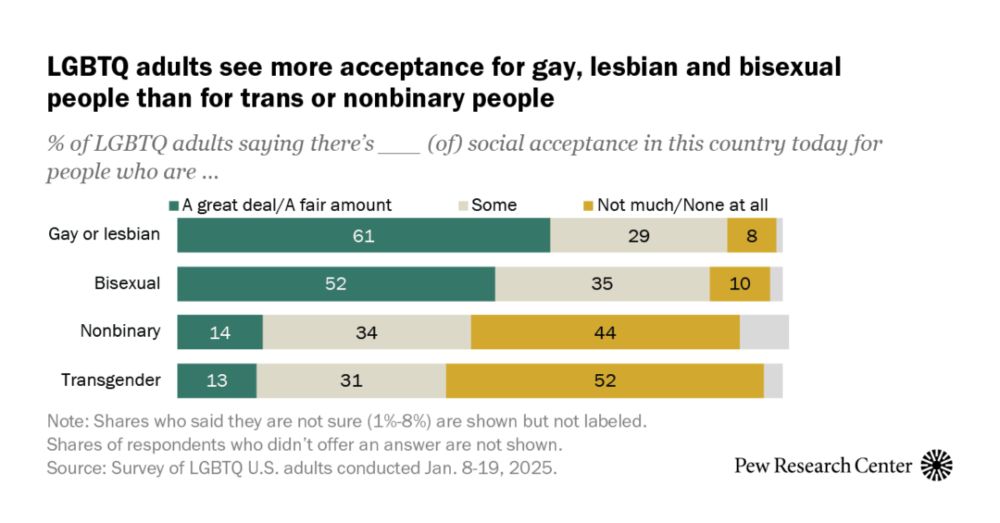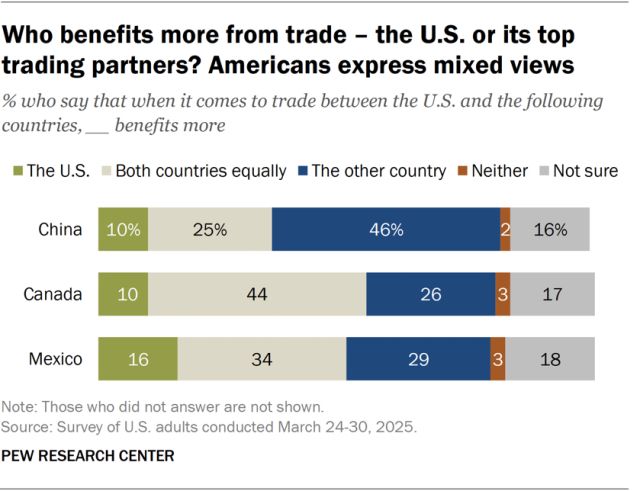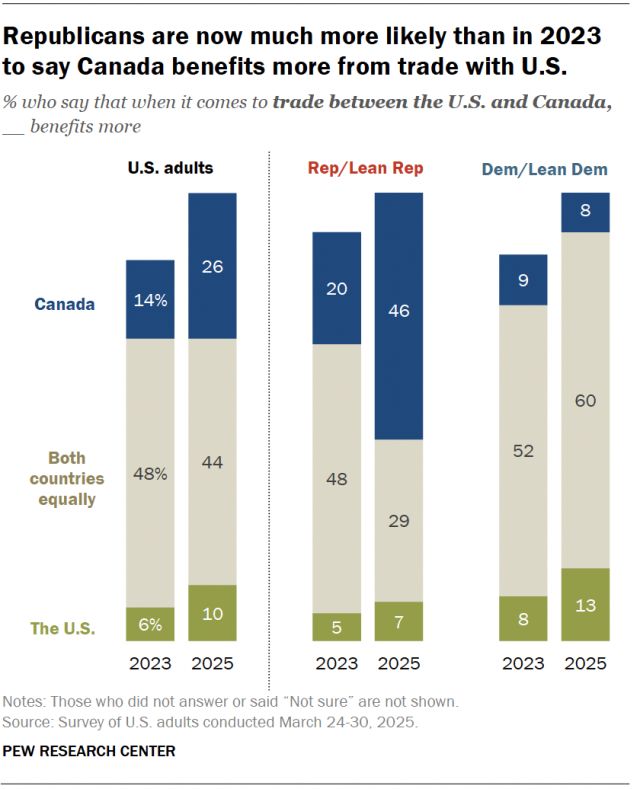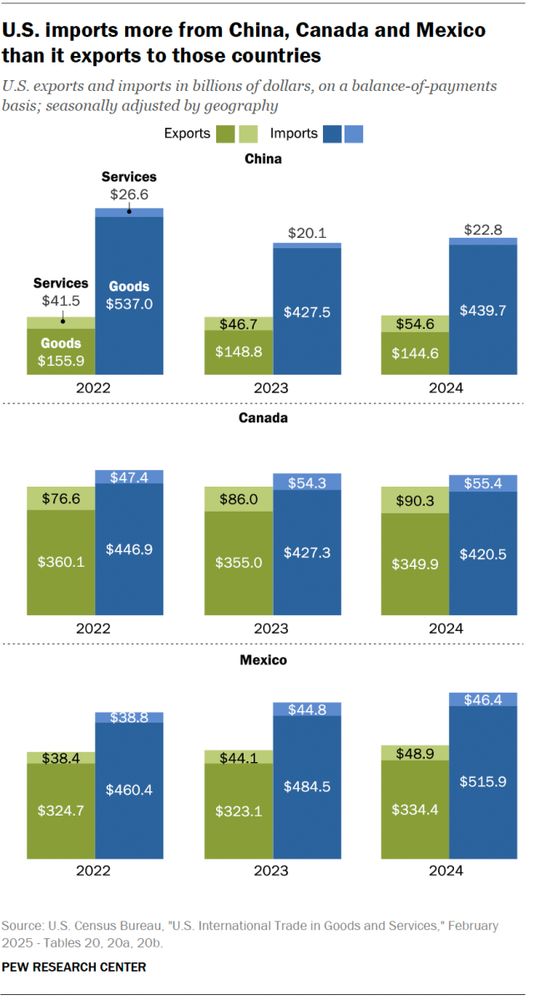
All of my holds on Libby coming in today like...
02.10.2025 21:45 — 👍 3 🔁 0 💬 1 📌 0@kirstenlesage.bsky.social
Mixed-Methods Researcher at Pew Research Center | PhD in Developmental Psychology | she/her

Picture of my name tag, which says my name (Kirsten Lesage) and institution (Pew Research Center (USA))
At a great conference on non-religion and secularity in Bratislava, Slovakia this week!
thensrn.org/2025-nonreli...

Bar chart showing roughly three-quarters of Americans have experienced an online scam or attack
New report out today from @pewresearch.org showing 73% of U.S. adults have experienced some kind of online scam or attack.
And it's not just happening to older adults! About a quarter of 18-29 year olds say they have had three or more of these scams/attacks happen to them!
More ➡️ pewrsr.ch/3IS7h4a

Pictures of a white vase with bluebell flowers painted on

A white vase with blue flowers painted on
Highly recommend pottery painting as a fun team bonding activity! Love how my vase turned out!
22.07.2025 16:12 — 👍 8 🔁 0 💬 0 📌 0
Today we released a major @pewresearch.org survey of LGBTQ adults looking at:
▶️ Views of social acceptance for LGBTQ people
▶️ Personal experiences with acceptance, discrimination
▶️ Experiences with coming out
▶️ Identity
▶️ Community, friends and LGBTQ spaces
Read on for findings from each section.

Read more in the report in the link below 👇
pewrsr.ch/43vZaC1
5/end

Table showing 10% of Americans consult astrology, tarot cards or fortune tellers, believing they offer helpful insights
But most Americans who engage in astrology, tarot cards or fortune-telling say they do it for fun, rather than for insights or guidance on life decisions.
4/

Table showing large differences by age in consulting astrology, tarot cards and fortune-telling
Interestingly, about half of LGBT Americans (54%) consult astrology or a horoscope at least yearly – roughly twice the share among U.S. adults overall (28%).
3/

Chart showing % of U.S. adults who consult astrology or a horoscope, tarot cards, a fortune teller , and at least one of the three.
- 28% of U.S. adults consult astrology or a horoscope at least once or twice a year or more
-11% of Americans consult tarot cards at least once or twice a year+
2/

New report out from @pewresearch.org by my colleague @chiprotolo.bsky.social finds 30% of Americans consult astrology, tarot cards or fortune tellers. 👇
pewrsr.ch/43vZaC1
1/n

A closer examination of the gender gap in knowledge assessments: Are women more likely than men to say, “I don’t know?”
Excited to present on "A closer examination of the gender gap in knowledge assessments: Are women more likely than men to say, “I don’t know?”" at WAPOR this morning!
15.05.2025 16:27 — 👍 4 🔁 1 💬 0 📌 0
Picture of my conference badge in the hotel lobby that used to be a train station
In St. Louis for WAPOR this week! Looking forward to hearing presentations about public opinion research around the world and presenting on Thursday!
13.05.2025 21:32 — 👍 0 🔁 0 💬 0 📌 0
There's TONS more in this report to read through if you're interested in knowing more!
pewrsr.ch/3YuHunI
5/end

Bar charts showing relatively few Japanese say religion is very important, but many believe parts of the world can have spirits
We found that even in countries where comparatively few people view religion as very important, many do hold beliefs in spirits and/or life after death. E.g., in Japan, 7% of adults say religion is very important in their lives, but 47% say there probably or definitely is life after death!
4/

Bar chart showing majorities in South and Southeast Asia attend religious services monthly or more often

Bar chart showing most Ghanaian adults believe spells or curses can influence people’s lives
This report also takes a closer look at more "traditional" measures of formal, organized religion (e.g., frequency of religious service attendance) AND newer measures that get at a range of spiritual beliefs and practices (e.g., belief that spells or curses can influence people's lives)
3/

Bar chart showing majorities in most countries surveyed say animals can have spirits or spiritual energies
Belief in spirits & life after death is fairly common around the world! AND this is true regardless of religious identity! e.g., 83% of adults in India, which has a Hindu majority say that animals can have spirits or spiritual energies, as do 76% in Christian-majority Argentina
2/

Really excited to share a new @pewresearch.org report from my team published earlier this week on religion and spirituality in three dozen countries around the world!
pewrsr.ch/3YuHunI
1/n

Decline of Christianity in the U.S. Has Slowed, May Have Leveled Off:
www.pewresearch.org/religion/202...

10 facts about U.S. Catholics:
www.pewresearch.org/short-reads/...

Most U.S. Catholics Say They Want the Church To Be ‘More Inclusive’:
www.pewresearch.org/religion/202...
Curious about Catholicism in the U.S. given the newly elected Pope Leo was born in Chicago? My colleagues at @pewresearch.org have written several fantastic reports about Catholics in the U.S., including these recent pieces linked in the thread below: 👇
08.05.2025 19:48 — 👍 7 🔁 6 💬 2 📌 0


Now that @pewresearch.org on Bluesky is a thing, I'll try to post new data from our Global Attitudes research!
First up today, timely data on how Americans view trade between the U.S. and China, Canada and Mexico. Includes public opinion and trade data!
www.pewresearch.org/short-reads/...
What would you like Pew Research Center to share on Bluesky? 👀 Share your thoughts and suggestions in the post below from @pewresearch.org 👇
07.04.2025 19:25 — 👍 5 🔁 0 💬 1 📌 0This is amazing. Highly recommend reading through these beautiful slides as they are both informative and extremely relatable 🤭 Your future self and your colleagues will thank you.
04.04.2025 01:38 — 👍 4 🔁 1 💬 0 📌 0
Selfie in the Pew Research Center studio
Back in the studio today for more interviews with journalists for our latest report on religious switching!
pewrsr.ch/4hK1ucL
You can also listen to me discuss the findings of our study with Jason DeRose on @npr.org All Things Considered! 👇
www.npr.org/2025/03/26/n...

There's LOTS more in this report, including a closer look at switching into and out of not just Christianity, the religiously unaffiliated, and Buddhism, but also Islam, Hinduism, and Judaism!
pewrsr.ch/4hK1ucL
6/end

Chart showing ratios of adults who have left Christianity to those who have joined Christianity, by country.
Christianity & Buddhism have the biggest losses from religious switching. In the U.S., Christianity has lost 6 people for every person it has gained through religious switching. But in a handful of countries (e.g., Singapore), Christianity is making small gains from religious switching.
5/

Chart that shows in many countries, the religiously unaffiliated are making large gains from religious switching
In fact, the religious unaffiliated (atheists, agnostics, "nothing in particular") have the biggest gains from religious switching. In Italy, for example, the religiously unaffiliated have gained nearly 29 people for every person they have lost through religious switching.
4/

Bar chart showing most religious switching has been by people who were raised in a religion and are now unaffiliated

Chart showing that most religious disaffiliation in the 36 countries surveyed is from Christianity.
Most of the switching is disaffiliation – people leaving the religion of their childhood and no longer identifying with any religion. And most of this disaffiliation is from Christianity.
3/